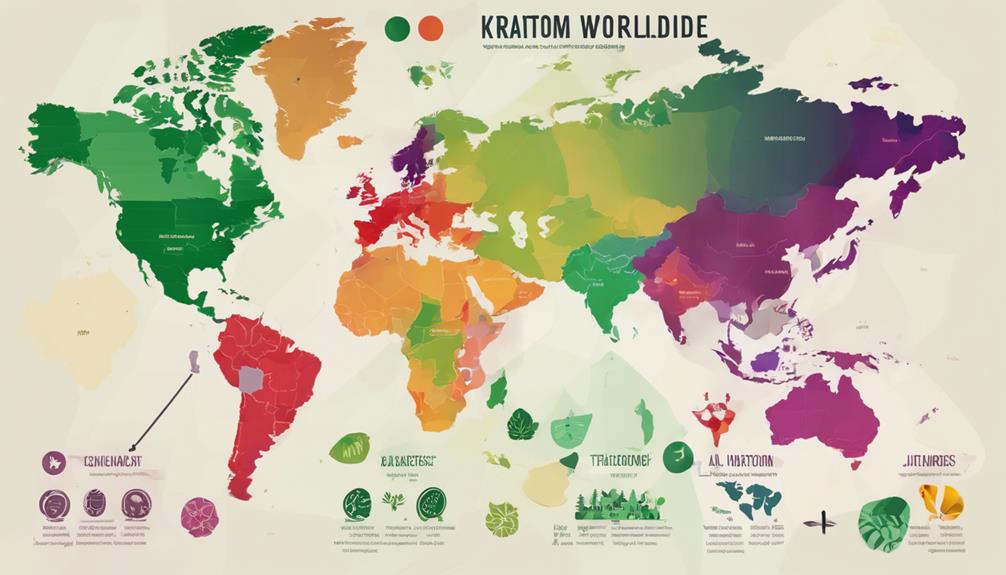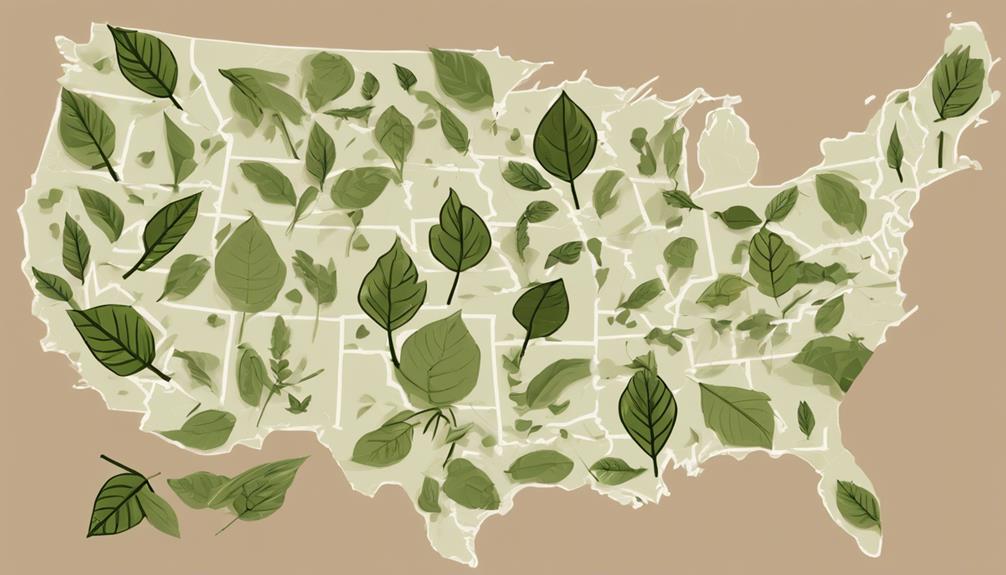Deprecated: mb_convert_encoding(): Handling HTML entities via mbstring is deprecated; use htmlspecialchars, htmlentities, or mb_encode_numericentity/mb_decode_numericentity instead in /home/users/kratomfiles/www/kratomfiles.com/wp-content/plugins/quick-adsense-reloaded/includes/template-functions.php on line 3552
Did you know that Kratom is legal in Canada, but with restrictions on its sale and distribution? Before you decide to purchase or use Kratom in Canada, it's important to understand the specific regulations surrounding this substance. Understanding the legal landscape and potential changes can help you navigate the complexities of Kratom use within the Canadian legal system. Stay informed to guarantee compliance and safety regarding Kratom in Canada.
Key Takeaways
- Kratom is legal for research purposes in Canada.
- Health Canada regulates Kratom as a health supplement.
- Possession and use vary across Canadian provinces.
- Kratom is not illegal for personal use nationally.
- Legal status subject to change with ongoing research.
Legal Status of Kratom in Canada
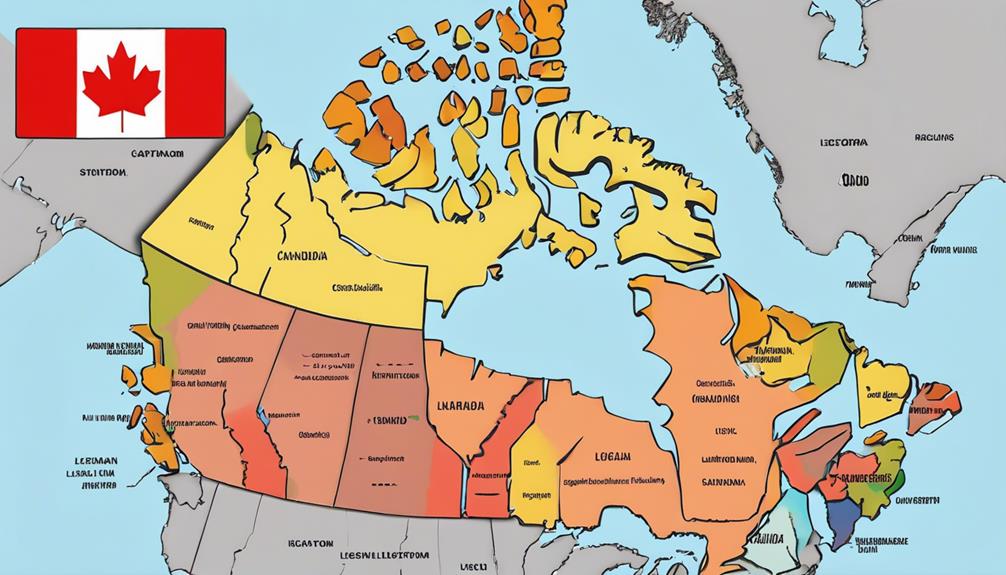
In Canada, the legal status of Kratom is defined by Health Canada regulations, which permit its sale primarily for research purposes only. While Kratom is considered a health supplement and not illegal for personal use at a national level, Health Canada has raised concerns about its safety. The possession and use of Kratom vary across provinces and territories due to differing regulatory frameworks.
Health Canada closely monitors the importation and sale of Kratom products, highlighting potential risks such as addiction and side effects. Although Kratom is legal in Canada, it has not been approved for medicinal purposes, emphasizing a distinction between its availability as a health supplement and its use as medicine.
As the legal landscape surrounding Kratom evolves with ongoing research, individuals in Canada should stay informed about any changes in regulations that may impact the status of Kratom as a health supplement in the country.
Federal Regulations on Kratom
In Canada, Kratom falls outside the purview of the Controlled Drugs and Substances Act, which means it is not classified as an illegal substance at the federal level. Health Canada, however, has voiced concerns about the safety of Kratom and restricts its sale due to potential risks such as addiction. Understanding the government's stance on Kratom and staying informed about any legal status updates is essential for those interested in using or selling Kratom in Canada.
Canadian Kratom Legality
Regulating the safety and sale of kratom in Canada, Health Canada and the Canadian Food Inspection Agency oversee the legality of this substance. Health Canada is responsible for monitoring the safety and sale of kratom products in powder and capsule forms. The legal status of kratom in Canada is subject to change as ongoing research sheds light on its effects. It is essential for both residents and visitors to stay informed about the regulations surrounding kratom in Canada. Health Canada and the CFIA caution against the consumption of kratom due to potential health risks. As the Canadian government continues to evaluate kratom, staying up-to-date with the current laws and advisories is important for those interested in the substance.
Government Stance on Kratom
The stance of the Canadian government on kratom is characterized by a lack of federal regulation under the Controlled Drugs and Substances Act. This means that at the national level, kratom is not considered illegal for possession and personal use. However, Health Canada has raised concerns regarding the health risks associated with kratom, such as addiction potential. As a result, the sale of kratom is restricted by Health Canada, and products containing kratom for ingestion are often seized as they are not approved as health products or medications. Importation of kratom into Canada is closely monitored by the Canada Border Services Agency in conjunction with Health Canada to uphold compliance with existing regulations and to address any potential health risks associated with the substance.
Legal Status Updates
Monitoring the legal status updates and federal regulations on kratom in Canada is essential for staying informed about its current status. Health Canada and the Canadian Food Inspection Agency regulate the legal status of kratom, with Health Canada overseeing its sale in powder and capsule forms. The legal status of kratom in Canada is subject to change as research on its effects progresses, making monitoring laws surrounding kratom imperative for residents and visitors. Both Health Canada and CFIA advise against human ingestion of kratom due to safety concerns.
| Agency | Role |
|---|---|
| Health Canada | Regulates sale of kratom in powder and capsules |
| Canadian Food Inspection Agency | Involved in regulating kratom in Canada |
Provincial Perspectives on Kratom Use
How do various Canadian provinces perceive the use of kratom within their jurisdictions? Provincial perspectives on kratom use vary across Canada due to the differing regulatory frameworks and concerns raised by health authorities. Some provinces have taken a careful approach, with local health authorities issuing warnings about the potential risks associated with kratom consumption. Additionally, municipalities may impose zoning restrictions or bylaws that impact the accessibility of kratom products within their jurisdiction.
The legal landscape surrounding kratom in Canada is dynamic, as governments evaluate the potential benefits and risks of its use. This evaluation process could lead to changes in regulations at both the federal and provincial levels. It is essential for individuals to stay informed about the current legal status of kratom in their specific province to maintain compliance with existing regulations.
Health Canada's Position on Kratom
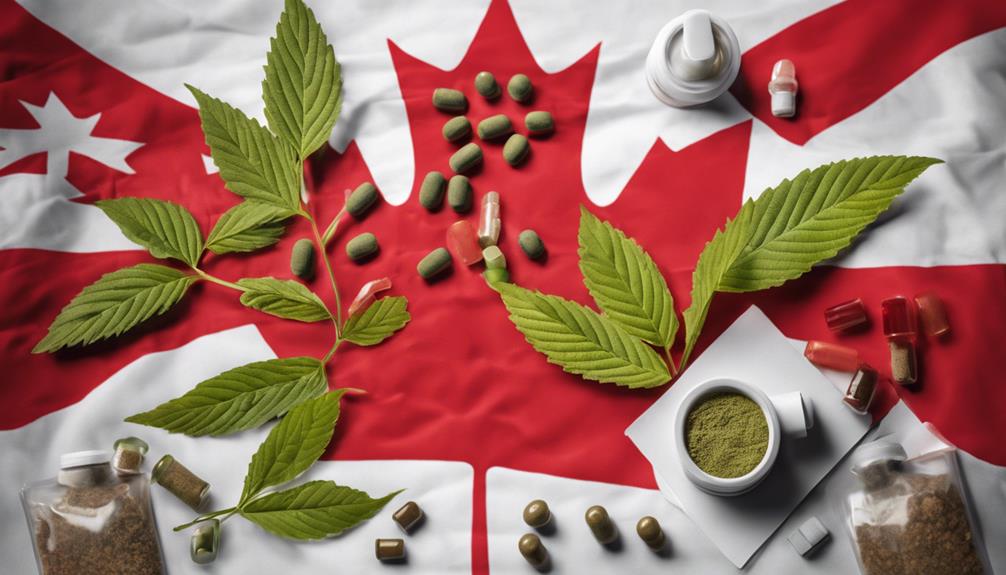
Health Canada's position on kratom is essential to understand its legal status in Canada. The regulatory measures in place reflect Health Canada's caution towards kratom consumption. Public health concerns drive Health Canada's oversight of kratom importation and sales.
Health Canada's Stance
While expressing safety concerns, Health Canada has imposed restrictions on the sale of kratom for consumption in Canada. The regulatory body oversees the quality and distribution of kratom products, emphasizing safety due to potential health risks. Health Canada does not endorse the use of kratom for medicinal purposes and cautions against its consumption. The agency closely monitors the online sale and importation of kratom, issuing warnings to the public about its associated risks, including addiction, withdrawal, and adverse effects. Below is a table summarizing key points about Health Canada's stance on kratom:
| Health Canada's Stance on Kratom | Details |
|---|---|
| Safety Concerns | Restrictions on consumption |
| Quality Control | Regulated by Health Canada and CFIA |
| Medicinal Use | Not approved in Canada |
| Public Warnings | Risks and potential dangers |
Regulatory Measures in Place
Regulated by Health Canada, kratom in Canada is subject to strict oversight to guarantee compliance and safety standards are met. Health Canada advises against human consumption of kratom, and the Canadian Food Inspection Agency monitors the manufacturing process to ensure adherence to regulations. While kratom is legal in Canada, it is not approved for medicinal use by Health Canada. The legal status of kratom remains subject to change pending further research on its effects. It is important for individuals in Canada to stay informed about and comply with the monitoring regulations set by Health Canada to promote the safe use of kratom products within the country.
Public Health Concerns
Expressing safety concerns about kratom, Health Canada has imposed restrictions on its sale for human consumption. According to Health Canada, kratom is not approved for medicinal use in Canada, and the agency closely monitors its importation and sale due to potential risks like addiction and withdrawal. Concerns highlighted by Health Canada include potential side effects, abuse potential, and interactions with medications. Additionally, the lack of regulation in the kratom industry raises quality control and contamination issues, further supporting Health Canada's stance on the restrictions. It is essential to heed Health Canada's warnings to guarantee public safety and well-being when considering the use of kratom.
Safety and Health Concerns

Highlighting potential safety concerns, Health Canada emphasizes the risks associated with Kratom, including addiction and withdrawal, due to its unapproved status as a health product in Canada. The lack of approval means that the quality control of Kratom products is not regulated, raising concerns about contamination and varying effects on users. Health Canada actively monitors the importation and sale of Kratom, often seizing products intended for ingestion. Among the potential health risks cited are constipation, dependency issues, and the differing impact Kratom may have on individuals. While Kratom remains legal in Canada, it is important to note that it is not approved for medicinal use. Ongoing discussions are being held to assess the viability of Kratom as a health product in the Canadian market. As users navigate the availability of Kratom in Canada, staying informed about the associated safety concerns and potential risks is essential for making informed decisions regarding its usage.
Public Perception and Usage in Canada
The increasing usage of Kratom in Canada, driven by online communities and self-treatment practices, reflects a diverse demographic of users with varying perspectives on its benefits and risks. Online platforms play an important role in shaping public perception about kratom through shared experiences and discussions. Here are some key points to keep in mind regarding Kratom public perception and usage in Canada:
- Diverse Demographics: Kratom users in Canada come from various backgrounds, leading to a wide range of opinions on its efficacy and safety.
- Therapeutic Benefits: Advocates tout the therapeutic benefits of kratom as a potential alternative to opioids, especially in managing pain and aiding in opioid withdrawal.
- Health Risks: Opponents express concerns about the lack of clinical trials, safety regulations, and potential health risks associated with kratom use, highlighting the need for more research and oversight.
- Online Influence: Online communities play an important role in spreading information about kratom, both positive and negative, which greatly impacts public perception and individual decisions regarding its use.
Kratom in the Canadian Legal System

Kratom's legal status in Canada as a health supplement is regulated by Health Canada, with restrictions imposed on its sale for research purposes only. Health Canada monitors the legal status and regulation of kratom due to safety concerns, such as addiction and potential side effects. While possession and personal use of kratom are not nationally illegal in Canada, the sale of ingestible kratom products is restricted. Importation of kratom into Canada is overseen by the Canada Border Services Agency and Health Canada to guarantee compliance with regulations. The legal landscape surrounding kratom in Canada is dynamic, subject to changes as Health Canada evaluates the risks and benefits associated with its use. Stay informed about any updates or modifications concerning kratom's legal status in Canada to ensure you are in compliance with the regulations set forth by Health Canada and other governing bodies.
Shipping Kratom Products To and From Canada
To navigate the shipping of kratom products to and from Canada, it is imperative to adhere strictly to Health Canada and CFIA regulations for smooth transactions. Here's what you need to keep in mind:
- Labeling and Documentation: Make sure all packages are correctly labeled with necessary information and accompanied by the required documentation.
- Customs Inspection: Be prepared for customs authorities to inspect and verify shipments of kratom products entering or leaving Canada.
- Reputable Carriers: Work with reputable carriers experienced in handling kratom products to ensure safe and timely delivery.
- Compliance with Regulations: Failure to meet regulatory requirements can lead to seizure of kratom products during shipping, emphasizing the importance of following legal guidelines.
Is Kratom Legal in Canada and Can It Cause Heart Problems?
Yes, kratom is legal in Canada, but it’s not without controversy. Some studies suggest a link between kratom and heart issues. While the research is inconclusive, it’s essential to use caution and consult a healthcare professional before using kratom, especially if you have preexisting heart conditions.
What is the current legality status of Kratom in Canada?
The current legality status of kratom in Canada is that it is illegal to buy, sell, possess, or produce kratom for human consumption. Health Canada has advised against the use of kratom due to potential health risks, and it is classified as a controlled substance under the Controlled Drugs and Substances Act. Kratom legality in canada is a complex and evolving issue.
Kratom Products Labeling in Canada
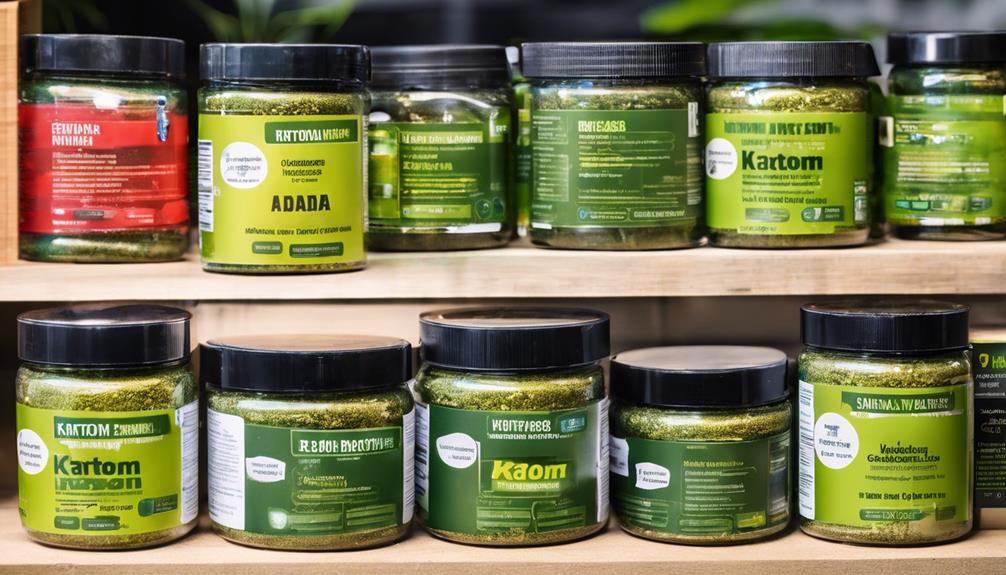
Properly labeled packaging plays a vital role in ensuring compliance with Canadian regulations for Kratom products. In Canada, the Canadian Food Inspection Agency (CFIA) has not specifically tested Kratom for oral consumption, underscoring the importance of accurate labeling to inform consumers about the product's contents and usage. While there are currently no strict regulations on buyers of Kratom products in Canada, adhering to labeling requirements is essential for both safety compliance and legal purposes. By labeling Kratom products appropriately, manufacturers and distributors help guarantee the safety of consumers and demonstrate their commitment to following Canada's regulations. Although individual consumption of Kratom at home is not actively monitored by the government, the presence of clear and informative labels on products remains vital to ensure that consumers are well-informed about the products they are using. Adhering to labeling guidelines ultimately contributes to maintaining safety standards and upholding legal requirements within the Canadian market.


